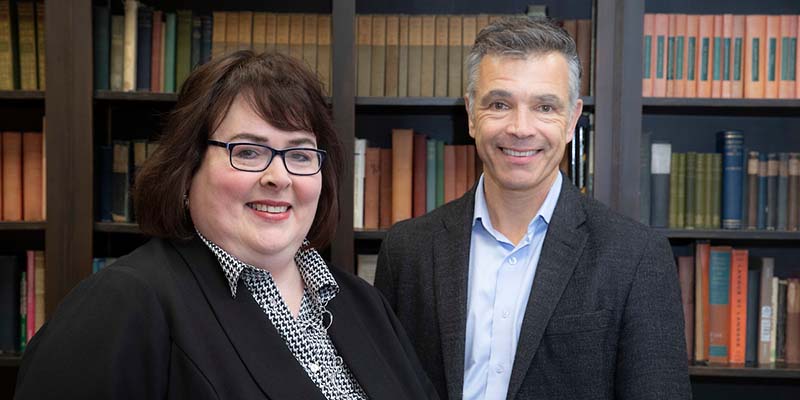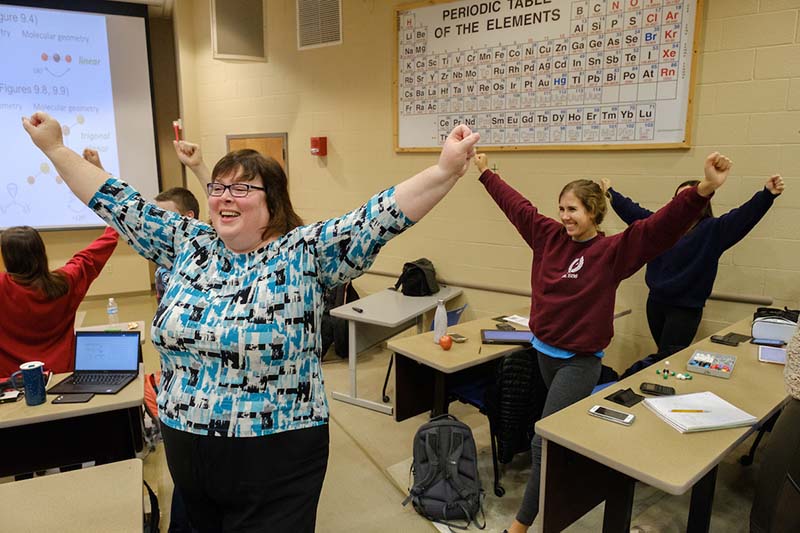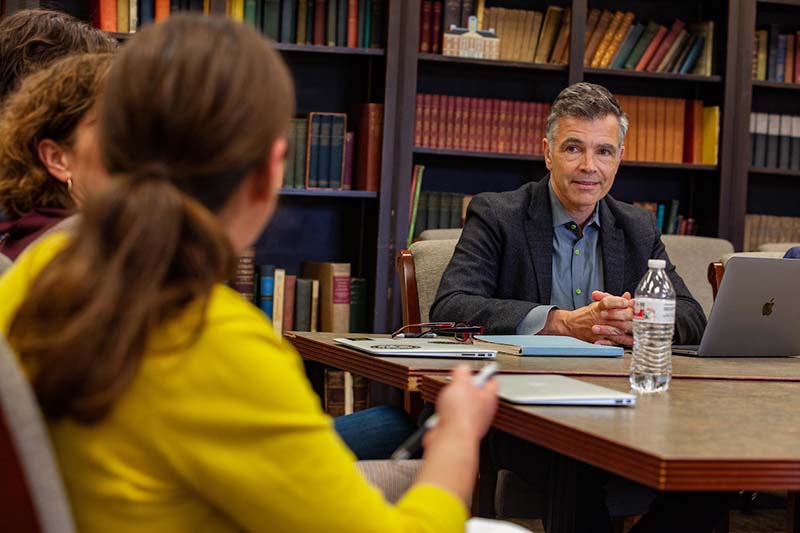

Stacey Lowery Bretz and Tim Melley awarded Benjamin Harrison Medallion
By Cliff Peale, director of executive communications
Finding a clearer understanding of the world around us – how molecules interact or the societal forces that shape our democracy – is at the heart of the teaching, research and service of Stacey Lowery Bretz and Tim Melley.
Bretz, University Distinguished Professor of Chemistry; and Melley, professor of English, are the winners of the 2020 Benjamin Harrison Medallion. Named for America’s 23rd president who graduated from Miami in 1852, the medallion is Miami’s most prestigious career faculty honor and recognizes “outstanding contribution to the education of the nation.”
Both have won Miami’s E. Phillips Knox Distinguished Teaching Award. Beyond their internationally recognized teaching and research, each currently serves in a leadership role to help address some of Miami’s larger challenges. Bretz chairs the Fiscal Priorities and Budget Planning Committee of University Senate, and Melley is the director of Miami’s Humanities Center.
They will receive the Harrison Medallion March 17 from President Greg Crawford at the university awards ceremony starting at 4:30 p.m. in the Armstrong Student Center Pavilion.
Sometimes you just have to get up and move to understand chemistry. Stacey Lowery Bretz introduces new concepts with new teaching methods.
Bretz recognized for improving chemistry education
Bretz, who started at Miami in 2005, remembers presenting her research at the American Association for the Advancement of Science (AAAS) conference while still a high school student in Sandusky. At Cornell University, she was the first in her family to graduate from college, before earning a master’s degree at Penn State University and returning to Cornell for her doctoral degree. Along the way, she thought there was a better way to teach chemistry.
“Our research findings generate evidence that chemistry faculty need to change how we teach,” Bretz said. “We’re trying to shift faculty from testing the memorization of facts and equations to measuring students’ understanding of the structure and function of molecules.”
She has turned this research into an internationally recognized lab that typically includes up to 15 Miami undergraduate and graduate students as team members. Continuously funded since 2001 with more than $5.2 million in external grants, the research earned her the prestigious Achievement in Research on Teaching and Learning of Chemistry award from the American Chemical Society this year.
The research involves teaching students to demonstrate their understanding of concepts, rather than just memorizing mechanisms and calculations. Bretz will hand students magnetic models of compounds and ask them to show her how a simple compound like table salt (NaCl) dissolves into water – and many can’t.
“Most students just memorize the symbols and equations,” she said. “If you ask them to draw a picture of what the particles are doing, most of them get it wrong. Memorizing is not understanding. That’s not to say there’s nothing to memorize. But it’s not sufficient.”
In nominating Bretz for the award, colleague Ellen Yezierski called her classes “student-centered, active, lively and exciting,” demonstrating “a deep regard for students intellectually and personally.”
Mike Crowder, chair of the department of chemistry and biochemistry, described a “typical year” for Bretz: Six peer-reviewed papers published, $600,000 in external funds procured, 10 conference posters presented, 11 invited speaking engagements (department seminars at other institutions and conferences), and seven contributed conference papers presented.
Bretz joined the Fiscal Priorities and Budget Planning Committee four years ago. She has become a leader among faculty in communicating the importance of practices and policies that shape Miami’s financial sustainability. This includes difficult conversations about the size and scope of Miami’s academic programs.
“It’s essential that we be able to offer academic programs that not only meet both student and employer demand but also generate enough net tuition revenue to sustain the costs of delivering our entire portfolio of academic programs,” Bretz said.
“Dr. Bretz has developed into a leading strategic thinker on our campus who will continue to lend her expertise to solving important problems,” Crowder wrote.
Tim Melley developed the Humanities Works program in partnership with Miami's Center for Career Exploration & Success.
Melley advocates for humanities students and faculty
Melley’s career is testimony to the value of the liberal arts – a bachelor’s degree in biology and English from Amherst College, master’s degrees from the University of Cambridge and Cornell and a doctoral degree from Cornell.
Melley is the author of two books and dozens of articles on American narrative since 1950. His research focuses on “problems that haunt democracy”: trust and authority, secrecy and openness, security and freedom. He is currently completing his third book, Threat Matrix: The Cultural Politics of Security in the Age of Terror. He has lectured widely in the U.S. and in Germany, England, Sweden, Norway and South Korea. His books and essays concentrate on paranoia, government security programs and the public sphere.
“These are the ideas that flow through our culture,” Melley said. “I’m interested in how they shape people’s thinking about democracy and citizenship.”
At Miami since 1995, Melley has taught more than 30 different courses on subjects ranging from the American suburb to terrorism. He is currently teaching “Literature and Medicine” as part of a new medical humanities minor he helped to develop.
“This litany of scholarly accomplishments is demonstrative of Dr. Melley’s incisive intellect, his meticulous and compelling research, and his genuine curiosity about how the world works, despite, or perhaps because of, its intricacies,” wrote Madelyn Detloff, chair of the department of English.
Since 2011, Melley has led the Humanities Center and developed more than a dozen new programs, including a faculty publishing initiative, digital humanities fellowships and undergraduate research apprenticeships. Collaboratives challenge faculty and students to work across departments on issues including global migration, climate change and modern medicine.
The Humanities Center organizes dozens of public events per year. Its research programs support hundreds of undergraduates and nearly 100 faculty members. Melley helped develop the John W. Altman Program in the Humanities, which unites Miami faculty with visiting scholars and a small cohort of students for a yearlong exploration of a critical social issue. In 2015, the Humanities Center won a prestigious $500,000 challenge grant from the National Endowment for the Humanities, providing the basis for a new $2 million endowment.
Melley’s work for the Humanities Center includes extolling the value and career prospects of liberal arts graduates at Miami. In 2014, he launched “Humanities Works” in partnership with the Center for Career Exploration & Success. The program provides evidence-based career advising in each humanities department and is now helping faculty build assignments including real-world interaction with potential employers.
“We want to be able to look parents in the eye and tell them we have a plan for their child’s career,” he said. “That’s really the goal of Humanities Works.”
Jacob Bruggeman, who graduated from Miami in 2019 and is pursuing a master’s degree in history at the University of Cambridge, said the Humanities Center sends a signal that Miami values high-level research in the humanities.
“Dr. Melley is constantly out there advocating for the humanities,” Bruggeman said. “He’s got his stuff together.”


